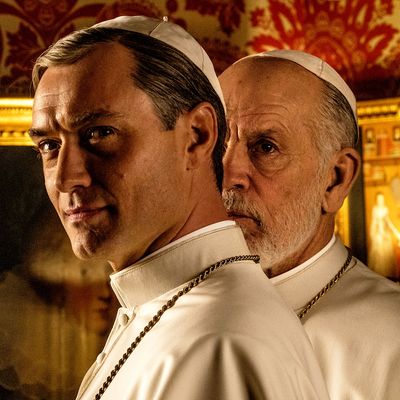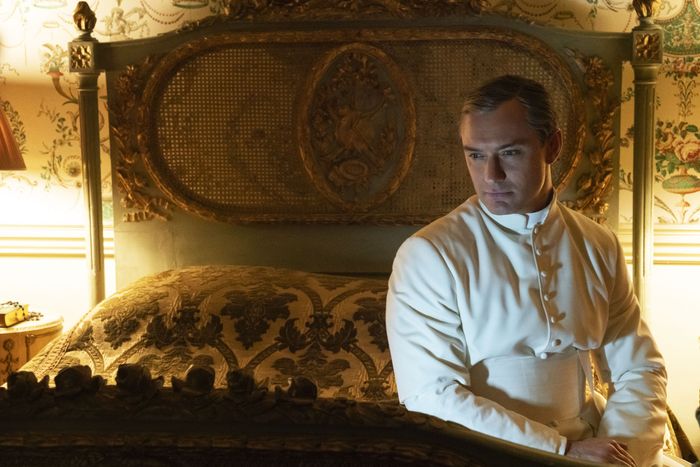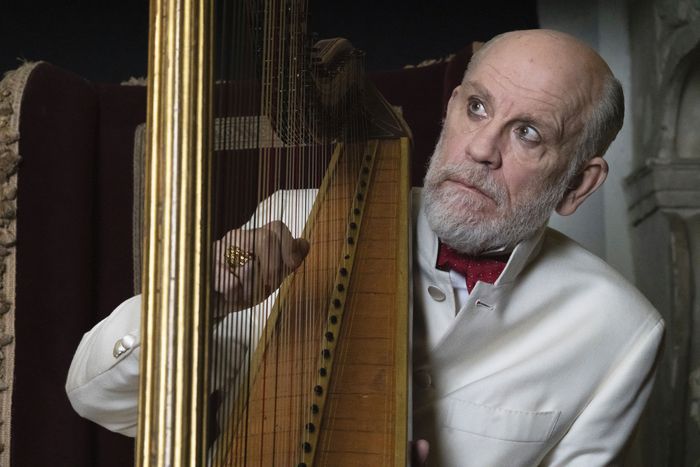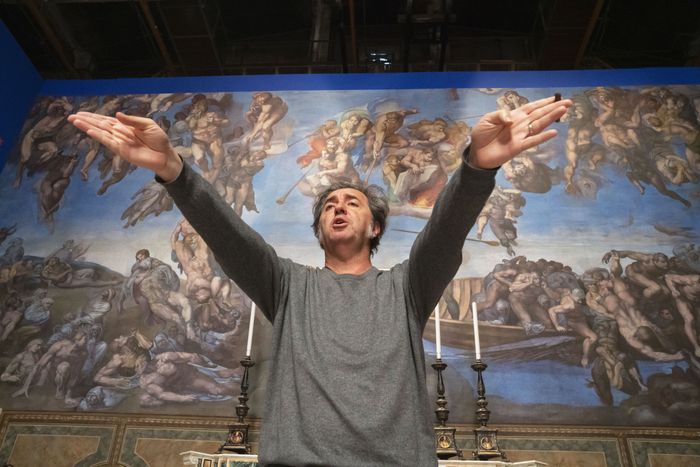
When The Young Pope originally aired in 2017, the idea of a second season seemed like a sinful pipe dream. Director Paolo Sorrentino’s first foray into television starred Jude Law as Lenny Belardo, an American cardinal whose surprising ascent to the papacy as Pope Pius XIII fostered global conflict, lush dress-up montages, and a surreal meditation on power, faith, and isolation — and that was all before it concluded with its protagonist’s seeming death. Yet, three years later, it’s time for The New Pope.
When the series begins Monday night on HBO, Lenny has been in a coma for almost a year, necessitating that the Catholic Church elect a new pope. After a round of Vatican intrigue, the conclave finds its man: John Brannox (John Malkovich), a depressive, wealthy English aristocrat and intellectual who rarely leaves his family’s palatial estate. Befitting The Young Pope’s depiction of a world where the Church was once the most important institution in existence, Brannox leads the Vatican through a conflict with an ISIS-like group. Meanwhile, though, a comatose Lenny has inspired a small band of Christian fanatics who believe he’s a living saint. When Lenny miraculously wakes up, some even begin to ask if he’s the Messiah himself.
In its nine episodes, The New Pope remains as elliptical, hilarious, and mysterious as The Young Pope, while moving to the fore issues around the felt presence of God and how we might react when confronted with the undeniably supernatural. Ahead of its premiere, Law, Malkovich, and Sorrentino sat down to talk about playing with multiple popes, the nature of faith, and why it’s a relief to tell a story with few absolute answers.
Paolo, at what point did you know there would be two popes? And how did you find someone to balance out the character of Lenny?
Paolo Sorrentino: During the editing of The Young Pope, it was a moment in Europe when there were a lot of terrorist attacks in France. I had this idea to use the coma of Lenny in order to have him as a sort of person that could be a saint, a guy that can wake up without a reasonable medical explanation. This could be something that, in my mind, could bring a risk of Catholic fundamentalism against the Islamic fundamentalism that, in that moment, was very strong and present in our lives. Of course, in order to have the pope in a coma, the Church, for several political reasons, must have a new pope. So that’s where we got to the idea of two popes.
Jude, what was it like to play Lenny again? There’s a whole thread in the first season of Lenny refusing to acknowledge he’s performing miracles. This time, the character essentially comes back from the dead.
Jude Law: I always held on to the conflict in Lenny’s head and heart about himself as a saint or as someone with powers beyond this realm. I love the human approach he has to all these extraordinary facts that are given to him upon waking up. He’s told that it’s a miracle, and he says, “No, I just woke up.” Sometimes what happened is inexplicable, and there’s something wonderful about his matter-of-factness that is both infuriating and maybe not the whole truth. But you have to look at it as real. As far as he’s concerned, he went to sleep, he woke up, and that’s all.
When it suits him, he plays the miracle card, but I think he’s in too much turmoil to consider himself a saint. If you interviewed him, I think he’d say, “If I’m a saint, why don’t I know where my mother and father are? If I’m a saint, why doesn’t God talk to me? Give me some hard evidence.” But then clearly, he can make some things happen.
John, what was it like coming into the second season of a show with such an established, singular tone and characters?
John Malkovich: I absolutely loved the first season, so I was just very happy to be among those people. Because of the way the first season ended, the Church has to go on and I am part of that continuation of the Church. But I really like all of these characters, so I was delighted to do it.
So much of the first season revolves around the nature of the papacy and Lenny doing whatever he wants. But John Brannox is a very different man than Lenny. How did you approach playing that character?
Malkovich: [Sighs] That’s a better question for Paolo, really.
Sorrentino: It was important to me that the character was a tired man, a man that has nothing to ask of life. It’s like he has seen everything and everything is boring for him. Except, maybe, the papacy.
In my mind, the character of John is interesting because he doesn’t want to be the pope. His real goal is to disappear, not to be the pope. Jude’s character did not want to appear but strongly wanted to be the pope. To be the pope, for the Catholics, is like being the second person after God. It’s a weight that is maybe too much to have. So at the end, maybe both of the popes will prefer to be in another place.
How did you approach playing someone with that much authority? Even if you’re a political leader, there are often ways for people to get rid of you, but if you’re the pope, you’re the pope.
Malkovich: In terms of the Catholic faith, you’re God’s representative on Earth — not the embodiment. I’m not sure that the pope’s authority is as expansive, or that his powers are as expansive, as one might think. There’s a whole apparatus of the Vatican state that pulls people in various directions. I think it’s very hard to imagine power, but it’s very easy to imagine responsibility. And this enormous, massive world of expectations and projections and fantasies and wishes.
Power is a rather different thing, in my opinion. But someone like my character, I don’t think he’s interested in power. Woburn Abbey [which stands in for Brannox’s family home] was given to the Duke of Bedford under, I think, Henry VIII. It’s a very old, storied family who owned thousands of acres on an estate. This is a house for Brannox’s family. So he never really needed to do anything at all. He took no part in managing the estate. He’s not someone who needed a job like that and, as Paolo says, is someone who had pretty much come to terms with the fact that there was nothing left for him to do that he actually wished to do. And then, suddenly, he’s recruited to become the pope. His relationship with power would be about the same as any person who would be put in that position.
That feels pretty different from Lenny’s approach to power.
Law: I think it is different. The way I always saw it with Lenny, he was putting everything on hold. He was so lost in his own drama that he almost froze the faith and reverted back to the book in order to buy himself time to figure out what the fuck he was going to do. It wasn’t until the end that he realized that the demand of power is that you have to be selfless. As soon as you start projecting your own ego through the power, you’re in really big trouble. Though Lenny is hugely egotistical, I think he was so lost in his own drama that he hid from it. He was just trying to figure out what to do before everyone figured out what he was doing. And the answer lay in opening his heart.
It sounds like you’re describing the Church as also being in a coma.
Law: Well it was, wasn’t it? Don’t forget those shots of the empty pews and the church doors with no faithful. He scared people away because he rejected what he saw as their shallow Catholic faith. I think he said, “I don’t want weekenders, I want you to be devout.” He did that because it was a challenge, but I think it came from a place of fear, too.
How did that change with the post-coma version of the character?
Law: He’s already gone through that process of opening his heart. He doesn’t retrace his steps, but he has to look at faith from a different angle — without the hat. He doesn’t have a crown anymore. And perhaps he has to face something that he was running away from during the first season.
Malkovich: What does a saint do except wrestle with God or fate against the limitations of being a human?
Law: He’s almost like a bridge. As a translation of faith. He doesn’t provide an answer or a cure. I think it’s important to say also that it’s rare you get to work on something where you don’t have to have definitive answers. One of the reasons I love Paolo’s work so much is that it’s amorphous. It can be affected by time, or the number of times you’ve seen it, or how you’re feeling. It’s poetic. My natural instinct is you try and nail things down. You’re constantly trying to say, “This is this, and this is this.” And I remember very early on Paolo saying, “Eh, you know, maybe?”
Let’s embrace that. Not that you’re asking for them, but I don’t think we’ll be able to give you answers. The beauty of this is that it moves, and the characters’ opinions move, and the moods move, and the piece moves. You don’t know always know whether it’s a fantasy or a dream, you know?
Malkovich: It’s an appropriate amount of mysticism, which is critical for the Church.
Was that your experience of playing Brannox, a character who is also adrift in a sea of faith?
Malkovich: I think Brannox’s faith, because of his personal history, is very damaged. He would like it not to be, but I think it’s quite damaged. That’s why you have Catholicism. There is an app for that. It’s called forgiveness.
I think he would probably view Lenny as possessing some qualities that may elevate him to some other status — whether it’s saint, all of whom were human, or somehow some kind of a deity. I think that’s what made Lenny a very special character. Brannox is a different breed of cat.
One of the things I love about the show is that the Church has a very strong aesthetic. What was it like stepping into that, and was there anything in particular you enjoyed about the trappings of the Church?
Malkovich: Paolo’s writing is a very specific thing that sets you up for the world. But the geography of the shooting lets you live in that world. The frames and the movement, or lack thereof, make you understand that world emotionally. The costumes are a huge factor. [The costume designers] work with the people who make them for the Vatican, so you get an idea of the symbolism, the ritual, the force, the need, and the passion with which those vestments and garments are imbibed. And you get, through the rituals of the Church, the weight and responsibility of what that must entail.
Law: I’ll add to that, that I was surprised by how familiar it all was, in a way, putting on costumes, playing to incredible sets, speaking from a script. Trying to make sense of the script you’ve got. There’s a direct relationship. Theater was born of it. Performance was born of it.
There are so many moments in the first season when Lenny engages with his own persona in that way.
Law: Exactly. He’s creating this image and playing with that image.







